Teen internet slang evolves at lightning speed, often leaving parents struggling to understand whether their child's online conversations are harmless or concerning. While most teen language is simply a way to connect with peers, some expressions can signal exposure to inappropriate content, risky behaviors, or harmful online interactions.
As a parent, you don't need to decode every abbreviation or trending phrase your teen uses. Instead, focus on recognizing patterns that might indicate your child needs guidance or protection. This comprehensive guide helps you identify thicc meaning, maintain open communication, and use effective monitoring strategies to keep your teen safe online.
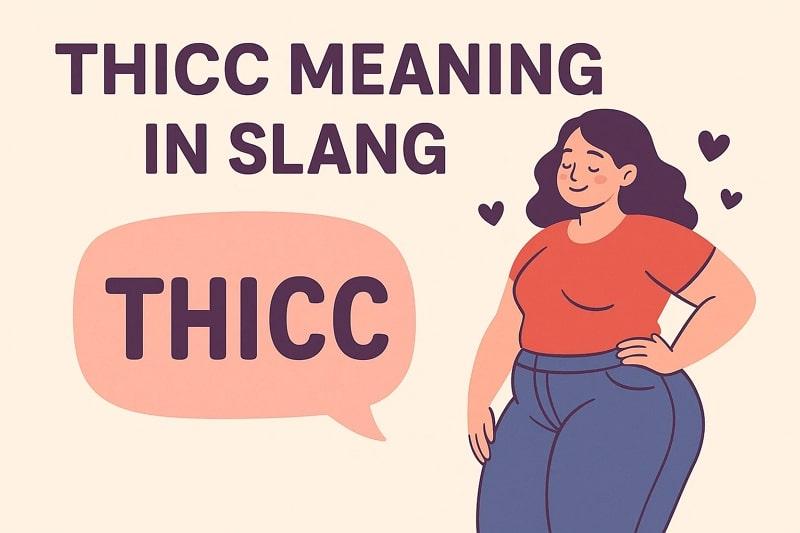
Table of Content
Part 1. What Does Thicc Mean in Slang
In teen slang, "thicc" typically refers to someone having an appealing, curvy body type. The term evolved from African American Vernacular English and gained mainstream popularity through social media platforms in the 2010s. While the basic thicc meaning involves physical appearance, the context of how teens use it matters significantly for parents to understand.
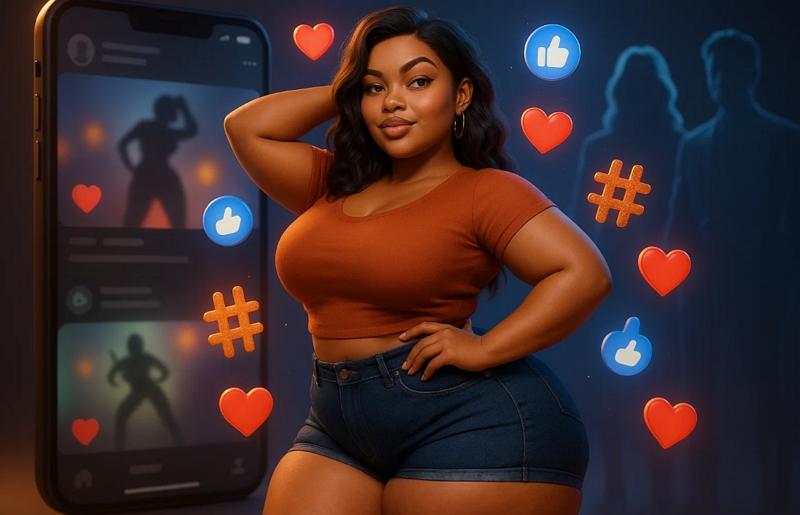
Understanding Context and Usage
Positive Usage: When used among friends as a compliment or in body-positive contexts, the term often expresses appreciation for confidence or self-acceptance. Many teens use it to celebrate diverse body types and challenge traditional beauty standards.
Concerning Usage: The term becomes problematic when used to objectify others, pressure teens about body image, or appears in conversations with unknown adults online. Parents should pay attention to who is using the term and in what context.
The "Dummy Thicc" Variation: This intensified version often appears in memes and gaming contexts, typically used for exaggerated or humorous effect rather than serious body commentary.
When Parents Should Take Notice
- Parents should be aware when "thicc" appears in contexts involving:
- Conversations with unknown adults online
- Pressure or bullying related to body image
- Inappropriate sharing of photos or personal information
- Discussions that seem to make the teen uncomfortable
What Does 'Thicc' Really Mean? 🕵️
Teens use slang like 'Thicc' to hide risky conversations. FamiSafe’s slang detection helps you understand their words and spot potential dangers before it’s too late.
Try FamiSafe FreePart 2. How Different Groups Interpret “Thicc” Slang
When looking at the dummy thicc meaning, it’s clear that the term has evolved beyond just a funny internet phrase. To understand this better, let’s explore how various groups interpret “Thicc” slang in unique ways:
Gen Z vs Millennials Understanding
| Interpretation Aspect | Gen Z | Millennials |
| Definition | “Thicc” means curvy, confident, and body-positive; often used to compliment peers, celebrities, or even fictional/cartoon characters in a playful way. | Seen as a playful twist on “thick,” usually referencing voluptuous figures in pop culture and hip-hop, with more focus on women’s bodies. |
| Usage Context | Social media, memes, TikTok, and hashtags like #ThiccQueen celebrate diversity and self-love. | Used in Instagram photos, music lyrics, popularized in rap and meme culture, but less prevalent in direct peer compliments. |
| Tone & Nuance | Playful, ironic, or exaggerated; often positive and self-affirming, though intent still shapes whether it’s respectful. | Compliments or jokes, sometimes sexualized or objectifying, are generally less broad in meaning and context. |
| Meme Influence | Drives viral memes, challenges, and creative hashtags; often paired with emojis for humor or self-expression. | Sparked early meme spread in the 2010s; music, TV, and celebrity culture fueled original "thick/thicc" memes. |
| Acceptability | Broadly accepted among teens; promotes body positivity, non-judgment, and celebrating all shapes and sizes. | Accepted in pop culture and media, though in peer use, it may sometimes be taken as objectifying. |
| Example Phrase | “Girl, you’re thicc af!” “Pikachu is thicc!” | “She’s looking thicc like a Kardashian.” |
Online Communities and Cultural Variation
- Meme Culture Influence: Thicc is used as a funny or hyperbolic praise on social sites, usually given to girls, characters, and even food.
- Body Positivity Spaces: It is an empowering term in online communities about self-love and inclusivity, with which to celebrate curves and unrealistic beauty ideals.
- Anime Influence: Thicc is common in gamer and anime fandom, where it is employed jokingly and appreciatively to describe exaggerated character design, and sometimes results in sexualization claims.
- Regional Differences: The West generally views it as a play on words, but in certain cultures, it can also be viewed as an insult or can be lost in translation.
- Subcultural Usage: It is a common in-group joke or compliment in the LGBTQ+ community, an aspect of identity and belonging to subcultures.
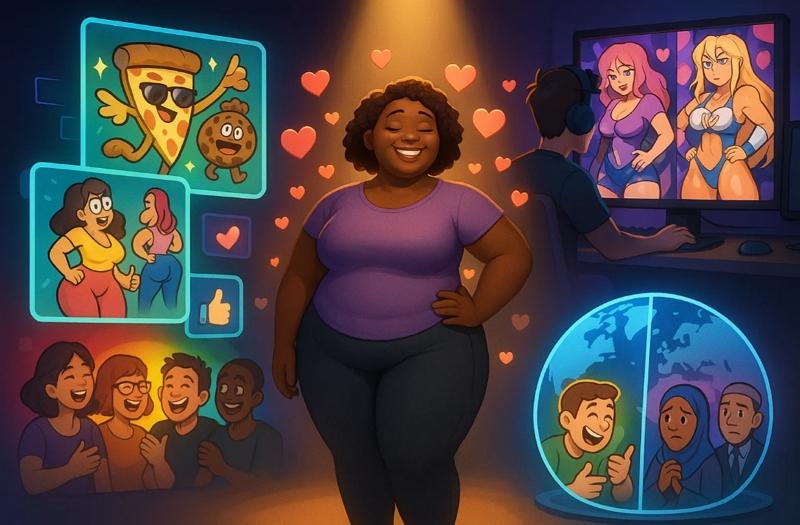
Where “Thicc” Can Be Misunderstood
It is important to mention that what does thicc mean in slang is usually context-dependent, which is why misconceptions can be easily produced, like this:
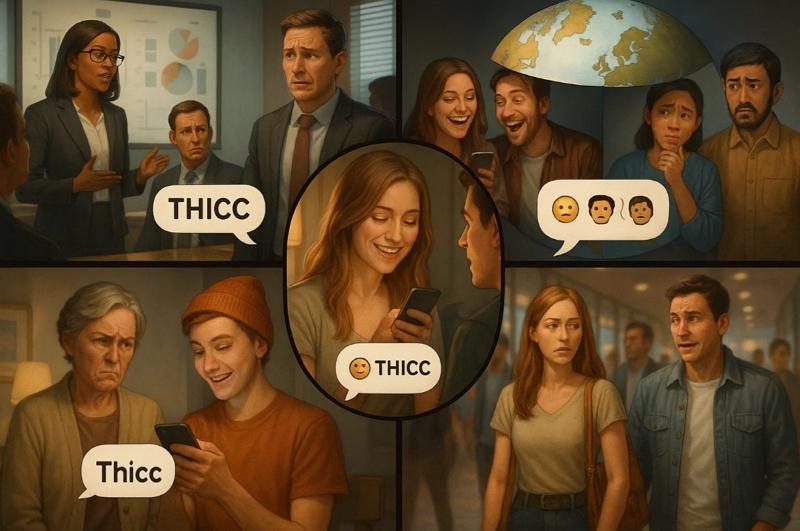
- Professional Environments: Thicc in the workplace or in academia can be non-professional and even degrading. The same thing that on the internet might appear as casual talk would be experienced as harassment when in a formal setup.
- Cross-Cultural Miscommunication: This word can be interpreted literally as thick and lose its playful meaning in those areas where English slang is not widespread. This may lead to misunderstanding or an insult to one instead of a compliment.
- Generational Gaps: Older generations often interpret the term thicc as derogatory, equating it with being fat, while modern usage typically frames it as a compliment celebrating curvy or confident figures. On its own, they will be able to read it as body-shaming but not body-positive slang.
- Online vs Offline Tone: Memes and emojis will usually make it evident that thicc is a joke in the online context, but in life, the word might sound objectifying. The lack of visual cues can easily change the perceived intention.
- Unwanted Attention: When used in a manner that is not consented to, thicc may be invasive or sexualized. Although such a remark may have been meant as a compliment, it will cause the other individual to feel uncomfortable or targeted.
Part 3. Why Parents Must See Teens Using “Thicc” Online
Exposure to slang may also lead to teens pushing into mature jokes or even sexual discussion, which they may not be fully aware of. Because of this, it is significant to introduce a parental control application, FamiSafe, which enables parents to direct safe use. It can track slang such as thicc meaning slang and dangerous online chat to notify parents in real time, enabling them to handle problems.
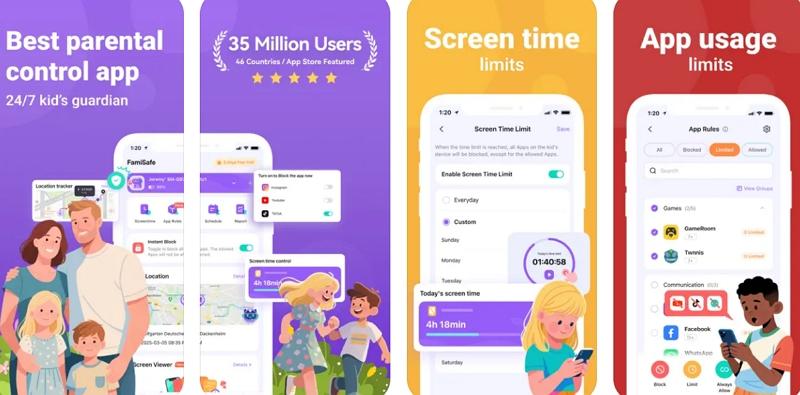
Moreover, the real-time content scanning of FamiSafe is regularly updated, and thus, parents are never left in the dark about the new lingo that their children may be exposed to on the internet. It is also possible to block apps that are not age-appropriate and filter unsafe sites by category, keeping children off adult or harmful sites.
Key Features
- Real-time alerts when concerning language patterns appear
- Context analysis to distinguish harmless usage from potential risks
- Cross-platform monitoring, including social media and messaging apps
- Screen time management to promote balanced digital habits
- Safe browsing controls to limit exposure to inappropriate content
Conclusion
To sum up, the meaning of 'thicc' may appear harmless on the surface, but it often carries deeper cultural and adult undertones. Parents play an important role in guiding kids toward healthy attitudes without discouraging curiosity. Tools such as FamiSafe can assist by monitoring online activity, helping parents promote safe communication and balanced digital habits.
Frequently Asked Questions
-
Why do teens use slang like “thicc” instead of regular words?
Teens also use slang to express humor or exaggeration or to identify with the online culture. Words like thicc are easy to remember as they are humorous in nature, which makes the conversations look entertaining and trendy. -
Can slang really influence the way kids think or behave?
Slang can indeed influence how children perceive themselves and others, especially when such words become normalized around body image standards or sexual topics. As an illustration, the "thicc" meaning may be a harmless Internet prank that promotes unrealistic expectations in real life. -
What’s the best way to address slang use with children?
The best approach is open communication; ask your child what the word means to them, and share your point of view. Instead of banning slang, putting it into context will help kids understand when it is safe and when it may not be.


